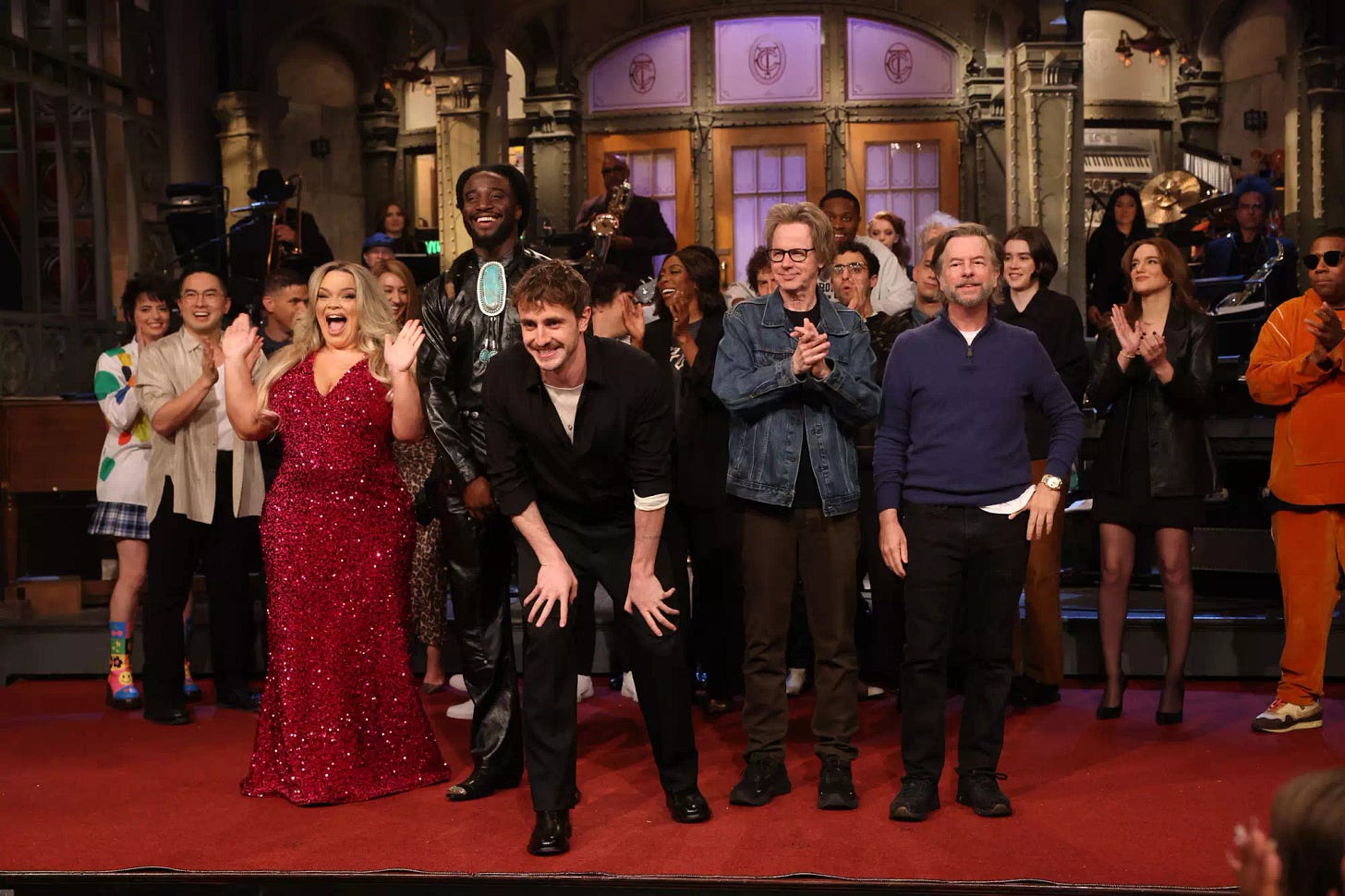Feeding the Machine
Trisha Paytas and the American Dream
If you are a part of my inner circle, chances are you’ve heard me say something along the lines of “Trisha Paytas is the Forrest Gump of the twenty-first century.” If you are one of the friends who’s heard me talk about this person and her impact on modern culture ad nauseam, apologies about what’s to follow.
Some of you, on the other hand, are reading this and are confused. You’re asking yourself who Trisha Paytas is, you may even be opening a separate tab to Google her. If this is you, I’m genuinely jealous - envious of how many hours of sleep you undoubtedly get. Allow me to explain.
I developed a fascination with Trisha Paytas’ YouTube channel during the decline of YouTube’s “golden era,” a period I would place around 2014-2017. In the preceding five years or so, sketch comedy, beauty influencing, online gaming, and YouTube “personalities” ramped to a level of popularity never before seen. YouTubers had approached celebrity status - they had developed devout fan bases and fortunes through self-made content and everyone wanted a piece of it. The millions of elementary and middle school-aged kids watching YouTubers suddenly had a new dream career in mind, achievable with a camera, an internet connection, and a sellable personality.
I had frequently witnessed Trisha Paytas guest starring in YouTube giant Shane Dawson’s videos - typically playing one out of a slew of offensively portrayed roles in his off-color comedy videos, usually a slut, a prostitute, or an idiot. Eventually, the YouTube algorithm began sending me recommendations from her own YouTube channel - these videos differed somewhat from the characters she played on Shane’s channel. She was still performing the role of the bimbo - the ditz - but in a less choreographed fashion. There were highly specific routine videos, storytime videos, vlogs, and high-production music videos featuring original songs - all of which were self-produced. There were unedited videos of her speaking to a camera while driving in her pink G-Wagon for forty minutes or while eating food in front of a camera (also known as “mukbangs”), during which she would speak - at times, nonsensically - about her life, her relationships, or her favorite movies. All of these videos had millions upon millions of views. Today, her channel has over five million subscribers.
Trisha Paytas’ Wikipedia describes her as an “American media personality,” which is fitting given her omnipresence across television, film, and digital media. You may not recognize her face or be familiar with her work immediately, but odds are she’s been involved with something you have consumed in one way or another, specifically media of the 2000s and 2010s.
Growing up, Paytas bounced between her divorced parents in Illinois and California before moving to Los Angeles at eighteen to pursue acting. After arriving in LA, Paytas worked as a professional lingerie model, stripper, and escort to support herself while attempting to make it big.
She then engaged in a series of odd job television appearances - an attempt, it seems, to throw anything and everything at the wall to see what stuck. In 2008, she appeared as a contestant on The Price Is Right and in the pilot episode of TLC’s My Strange Addiction for a “tanning addiction” (which she has since explained was grossly exaggerated). In 2011, she developed a new shtick - talking extremely fast. She appeared on The Ellen Show (where she introduced herself as a waitress) and America’s Got Talent (where she introduced herself as a computer programmer named “Trish, like fish”) to perform this skill. Between 2006 and 2013, Paytas would appear on dozens of scripted and unscripted television shows, including Conan, Dr. Phil, and The Millionaire Matchmaker. I recently rewatched old episodes of Modern Family and Nathan For You and saw her appear briefly, typically to deliver one dumb blonde girl line or act as sexualized set dressing before exiting stage left. You will also find her as a streetwalker in the music video for Amy Winehouse’s “Tears Dry on Their Own” and as a video girl in Eminem’s “We Made You” and The All-American Rejects’ “Beekeeper’s Daughter.”

Alongside booking miscellaneous TV gigs, Paytas also began posting videos to YouTube in 2007. Initially, her YouTube channel was dedicated to one of her heroes, movie director Quentin Tarantino, who she’s written a song about and met several times via mutual friends. But the channel later evolved into a more personal project. Paytas began divulging copious details about her life online, often via lengthy, unedited videos, sometimes reaching as long as sixty minutes. She shared information about everything - her past and current relationships, her experiences as an escort, her personal ambitions, her longing for love and attention. Over the course of her channel, she’s had several long-term boyfriends and would share intimate details about their romantic and sex lives. After the relationships ended, she would post videos of her grieving the breakup on her channel, flipping between tearfully wailing, exposing her past paramour’s secrets, or evangelizing about something as esoteric as identifying as a “chicken nugget.” While in the throes of heartbreak, one could expect several forty-minute videos from Paytas daily. Like talking extremely fast, “crying on the kitchen floor” became her new niche.
In 2021, Paytas was candid with Buzzfeed News about her history of substance abuse. She’s been sober since 2019 when following a public breakup with YouTuber and David Dobrik-hanger-on Jason Nash, she went on a binge of prescription pills, meth, and hallucinogens. During this period, she made countless videos taking wide swings at David Dobrik’s former “Vlog Squad” (members of this group have since been accused of rape, sexual assault, and providing minors with alcohol).
If there’s one thing that Paytas is online, it’s vocal - she’s unafraid to offer a blunt and extreme perspective on a matter, on any and all sides of any issue. Her brashness is what people love about her - it’s why she’s become the subject of countless Twitter reaction videos. And it’s also what’s gotten her in hot water time and time again.
Paytas has entangled herself in many controversies after making blase and impassioned political and ideological statements. She’s posted pro-Trump videos, ranting about how immigrants are stealing jobs from Americans (which she has since deleted and retracted her opinion on). After dressing up in Zac Efron cosplay in October 2019, she came out as a “trans man” despite admitting she identifies “1000 percent” with her birth gender. And she’s posted text screenshots featuring her making anti-semitic remarks towards former Frenemies podcast co-host Ethan Klein after the pair had a dramatic on-air fight, leading to the show’s demise.
In the case of Paytas, it’s challenging to discern which of these flubs are gaffs, intentional remarks, or simply a means to create a spectacle. In 2017, Paytas told Business Insider that many of her early YouTube videos consisted of her “dumbing [her]self down” to increase views. She cites endorsing Mitt Romney and making unfounded assertions like “dogs don’t have brains” as examples. “…I thought ‘trolling’ videos were what my channel was all about,” she says.
Despite her controversies, many have asserted that Trisha Paytas is “uncancellable” - people will get up in arms about something she says and then resume reposting her just seven days later. And there’s one reason why this is the case: shame - or, rather, a lack of shame.
Trisha Paytas’ entertainment value doesn’t lie in her ability to sing, dance, act, or story-tell. It doesn’t lie in her sex work or recent mom content or anything material that she’s put on the internet. It lies in her ability to put aside conventional conceptions of “shame” to pursue fame and attention - one of the only assets she’s ever wanted to obtain. Her Buzzfeed interview reads:
“All that cash is nice, but it doesn’t seem to have ever been Paytas’s primary goal. What they1 always wanted, first and foremost, was to be famous, at any cost. ‘I never sang or danced or acted, I was just like, I want to be famous,” they said. “I have some pride about it. I did that. I was the perfect troll.’”
Trisha Paytas didn’t enter the entertainment industry demanding the respect of a budding auteur. And professional respect clearly wasn’t granted to her willingly - given the roles she was cast in early in her career. Instead of leaning away from degradation, she dove into it headfirst - playing the caricature at full volume that viewers were already going to project onto her based on appearance and behavior. In doing that, she got away with expressing extreme sentiments without punishment. Because when nobody respects you, to begin with, there is no respect to lose.
Professional and famous artists - actors, singers, and the like - remain proud and private about their personal lives, often shielding fans from gazing at their close relationships and personal pain. A typical celebrity experiencing heartbreak or grief will hide from the hungry public, who is eager to dissect their agony via blurry paparazzi photos and coded Instagram stories.
Trisha Paytas, on the other hand, is the outcome of feeding this greedy machine - of giving it everything it wants whenever it demands it. She exemplifies the consequences of taking your personhood and slicing it into monetizable segments that can be co-owned, symbolically, by a cruel and scrutinizing public. She is what happens when you auction off ownership of your online identity, when you refuse an ego. The outcome of bottling and selling a reworked version of shame - about your body, your boyfriend, your identity - and, in a sense, your soul as a commodity. In this way, she is the perfect celebrity - the final form of an influencer, of a famous person. She is a lesson in what happens when you succumb to the monster - when you give all of yourself to an industry that wants to take all of it.
And what exactly is that lesson? What is that outcome? It’s a dangerous one. Trisha Paytas has an estimated net worth of $12 million, most of which is earned through her OnlyFans content. She lives in a mansion in Thousand Oaks, California with two young children and a husband who appears to love her. Last year, she guest-starred in an episode of Saturday Night Live with Oscar-nominated actor Paul Mescal - the audience uproared in applause when she appeared onscreen. On February 3, 2025, she will perform on Broadway in Trisha Paytas’ Big Broadway Dream - a one-night-only “musical theater extravaganza.” I suppose the cautionary lesson is that when you give the fame machine everything it demands of you, you will be rewarded handsomely. That if you bend to the stereotypes that will invariably be cast on you - that if you take every opportunity that you’re offered, regardless of how degrading they are - you will eventually get the chance to self-define. That if you expect no respect, you will eventually receive it.
And it’s the exact lesson that American dreams are built off - specifically American dreams of celebrity. That you will one day be vindicated after slogging through trenches of humiliation. That you can profit from objectification. That if you just give the people what they want - if you’re a dutiful dance monkey - they will eventually give you what you want. These are all silent promises made to aspiring American entertainers and even aspiring American artists. They are precarious promises that don’t work out, statistically speaking, for the majority. But for the glittering minority, within which Trisha Paytas seems to reside, it seems to be a dazzling American experience. Existing in the peripheries of major entertainment enterprises, paying your dues, until you inevitably end up in the foreground.
Trisha Paytas uses she/they pronouns







Been in and out of news on Trisha for what feels like forever now but I had no idea about the sheer amount of things they appeared in towards the beginning of their career, this is so well researched and fairly discussed. She is superb at getting reactions and managing them, but at the same time not needing to manage them at all, because like you said she is “uncancellable.” Such an interesting personality. I have disagreed with opinions/stunts she has done several times but I cannot wish ill on her, I will say it seems they always seem to come to see the light and correct past wrongs. But how much of that is real?? The illusion is so well maintained!!
What a good read!
I thought I had only encountered Trisha when the YouTube algorithm once offered her up. I was ill and found myself in a rabbit hole, touring the wardrobes of the wealthy. I remember how empty her relationship with every object around her was - and on more than one occasion, admitting she had no clue why it was purchased.
Also, thanks for pointing out she had made a much earlier appearance in my memory; the déjà vu while watching Eminem’s “We Made You” music video was dizzying.